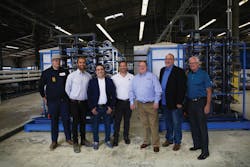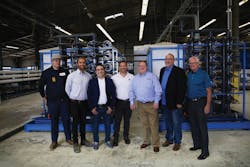Water Briefs
Produced water treatment plant to double capacity
MembranePRO Services and Watershed Tech Services have announced expansion plans to double production capacity by year-end at the Wasco Treatment Plant, California’s first-of-a-kind merchant facility to treat produced water for reclamation and beneficial reuse.
Strategically located near multiple active oil fields surrounding Bakersfield, the facility provides significant environmental and economic benefits to the region. Local oil and gas producers now have a reliable, economical and sustainable option for converting billions of gallons of produced water each year into high-quality clean water for reuse. Oil and gas producers, agriculture and industry throughout Kern County and Central Valley can now use this recycled water for their operations, reducing the need to utilize precious freshwater resources.
At present, the facility has established a daily capacity of 210,000 gallons per day of produced water for reuse and will rapidly scale to 420,000 gallons per day, which has been approved under the current permit and business license. The facility completed setup, testing and commissioning in February 2018, after initially treating 25,000 gallons per day under a pilot program permit issued in 2017.
Wash. sets rules for winery wastewater
Beginning next year, an estimated 100 Washington wineries will need a permit from the Department of Ecology to discharge wastewater. The rules that come with a permit will set limits on irrigating with water recycled after cleaning bottles, barrels, tanks and other equipment. The rules also will regulate storage ponds and watering down dusty roads.
Wineries that generate at least 53,505 gallons of wastewater a year will come under a regulatory approach used by Ecology to control wastewater from other industries, including fruit packers and vegetable processors. Ecology projects that wineries that make less than 17,835 gallons of wine a year will be exempt from the rules.
Pa. researchers attempt to grow hemp in coal waste using mine water
The state of Pennsylvania recently awarded a hemp research permit to the nonprofit U.S. Ecological Advanced Research & Conservation Hub in Mayfield and Lackawanna College for them to grow and explore potential industrial uses of hemp, the college announced.
The research will test whether hemp can grow with acid mine water irrigation and on culm land. If successful, hemp could help remediate old environmental problems and provide a new agricultural growth path. Researchers will tap acid mine water from a well drilled deep under the property to learn whether hemp can grow with tainted and reclaimed mine water.
H2O Innovation secures process water contract in U.S.
H2O Innovation Inc. was awarded five new water and wastewater projects in North America, worth USD$4.1M in total.
One of the projects consists of a partial upgrade to an existing system and will supply process water to an energy company located in the Midwest. Ceramic membranes will be used as pretreatment to a reverse osmosis system, treating 130 GPM (708 m3/day) from nearby lake water and effluent from tertiary treated wastewater. The difficult nature of the feedwater, and strict requirements for zero failure operation, necessitated the selection for this ceramic membrane product.
EPA seeks input for study on management of oil and gas wastewater
The U.S. EPA is embarking on a new study that will take a holistic look at how the agency, states and stakeholders regulate and manage wastewater from the oil and gas industry.
The focus of the Agency’s study will be to engage with stakeholders to consider available approaches to manage wastewater from both conventional and unconventional oil and gas extraction at onshore facilities. EPA’s study will address questions such as how existing federal approaches to produced water management under the Clean Water Act can interact more effectively with state regulations, requirements or policy needs, and whether any potential federal regulations that may allow for broader discharge of treated produced water to surface waters are supported.
Following this study, EPA will determine if future agency actions are appropriate to further address oil and gas extraction wastewater.

